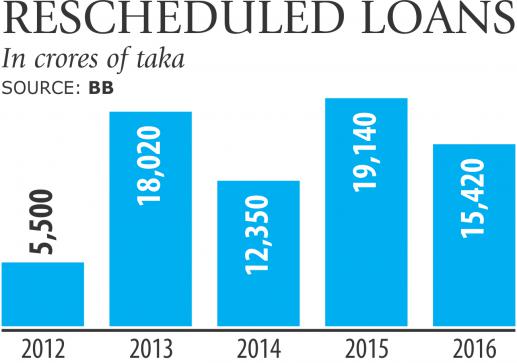Banks have rescheduled loans amounting to about Tk 70,400 crore of troubled borrowers over the last five years, putting extra pressure on the sector.
“The rescheduling of loans has created extra stress on the banking system in recent times as this constitutes a significant part of the banks’ total loan portfolio,” said the central bank’s Financial Stability Report 2016.
The report was unveiled yesterday by Bangladesh Bank Governor Fazle Kabir at an event that was attended by chief executives of all banks.
At the end of December last year, the loans that had been rescheduled at least once reached 10.5 percent of the banks’ total outstanding loans.
Of the total outstanding loans of Tk 673,720 crore, 75.8 percent are unclassified.
Along with over-leverage, poor due diligence, influenced lending, fraud and negligence in compliance with risk management practices could be the reasons for the rise in rescheduled loans, according to the report.
In 2012, about Tk 5,500 crore of loans were rescheduled, and from 2013 onwards the amount ranged from Tk 12,000 crore to Tk 19,000 crore.
Beyond the regular rescheduling in 2015, some large loans, of more than Tk 500 crore, were restructured for the long-term.
Many borrowers who took long-term loans are now unable to repay the loans properly.
The banking sector is said to be the main source of funds for fuelling economic growth through short-term investment, the report said.
“The piling up of rescheduled loans seems to be a matter of concern, though the banks are expected to be cooperative in assisting viable customers to sustain during difficult times by keeping their loans performing.”
Despite expected rescheduling, the high amount of rescheduled loans in the industrial sector, particularly garment and textile, in conjunction with the lack of required follow-up may create downside risks for the banking system as a whole, the report said.
Most loans were rescheduled in the garment and textile sectors: 22.7 percent.
The report also analysed the banks’ loan situation, profitability, deposit and various risks.
In 2016, the banks’ non-performing loans slightly deteriorated mainly due to the rise in the state banks’ default loans.
The state banks’ non-performing loans stood at 25.1 percent on an average and specialised banks 26 percent. In contrast, the private banks’ non-performing loans were 4.6 percent and the foreign banks’ 9.6 percent.
However, BB data shows the private banks rescheduled the highest amount of loans.
Of the total rescheduled loans in 2016, private banks accounted for 51 percent, state-owned commercial banks 42 percent, specialised banks 6 percent and foreign banks 1 percent.
Some 10 banks — five state banks, one specialised bank and four private banks — held more than two-thirds (65.3 percent) of the total outstanding rescheduled loans at the end of December 2016.
The government and the central bank are relentlessly working to maintain the current trend of high economic growth, BB governor Kabir said.
And for that, ensuring discipline and good governance of the banks and financial sector is urgently required, he added.
“You will have to be always vigilant so that the corporate default culture cannot engulf our financial sector.”

